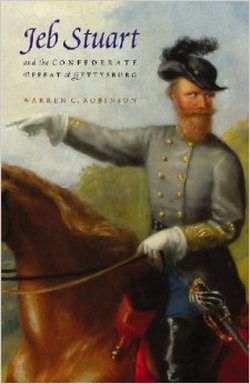
Warren C. Robinson
University of Nebraska Press, 2007, 205 pp., $17.95
ISBN: 978-0-8032-4856-4
Image Courtesy of amazon
There are some people who state that there is nothing new which can be written about the Battle of Gettysburg. In his work on the role of Jeb Stuart during the Gettysburg Campaign, Warren C. Robinson proves that there may be something new to talk about in the realm of Stuart’s participation in the battle. The debate has fueled for years ever since the battle had ceased whether or not the fault of the loss was on the shoulders of General Stuart or not. This work hopes to analyze all of the arguments surrounding the controversy and puts to rest any question over whether or not Stuart was at fault for the loss at Gettysburg.
Warren C. Robinson is a professor emeritus at Pennsylvania State University and is the editor of numerous works in the field of economics. He is also the author of many articles on military history and the policies set about therein. Currently, he is a freelance writer and consultant in Washington D.C. Though he has written other works about demographics and the economy, his main work on the Civil War is Jeb Stuart and the Confederate Defeat at Gettysburg.
Robinson does something quite different in this work compared to the many other studies on Jeb Stuart; he assumes the reader knows something about the main controversy surrounding the man and the campaign which happened. The first chapter deals with the beginnings of the campaign and writes in a fashion that only the subject at hand is mentioned. Next, he uses great passion to analyze the different sources of the orders and the memoirs of the primary sources to look into what really happened with General Stuart and the reasoning behind his late appearance to the battle. One thing which Robinson looks into, and proves with great detail, is the laid back attitude which Lee gave orders to Stuart during the beginning of the campaign. Robinson looks farther back into the official records to see what kind of attitude Lee writes toward Stuart and they are the same tone of voice as they are in the Gettysburg orders. The argument which has fueled many historian’s arguments about Stuart’s lateness to the laid back nature of the orders have been proven wrong due to Robinson’s research. The author also does well to talk about the memoirs and the major studies which have been brought about after the battle including those who were closest to General Lee and of course the controversial memoirs of General Longstreet. One of the other things which the author does is split up the narrative in an easy to read fashion that allows the reader to fully follow what the author is researching. After reading this study, I had to think about what I felt about Stuart throughout all of my reading of the Gettysburg Campaign. One interesting analysis of his character which Robinson points out was that there were two Jeb Stuarts: the first was cavalry commander who acted with the greatest professionalism and the other was the cavalier which many people think of immediately when they think of Stuart. These small details mad the read great and fantastic.
I highly recommend this book to anyone interested in the study of the Gettysburg Campaign. The views which are shown here can greatly change the way you look at the cavalry commander and his actions leading up to the fight at East Cavalry Battlefield. Stuart has always been a controversial figure in the Gettysburg Campaign and Robinson has set out to analyze what his role was in the Confederate defeat. The narrative was quite flowing and the research was impeccable. This book should be on the shelf of every Gettysburg historian and should not be missed. Highly recommended!
 RSS Feed
RSS Feed
